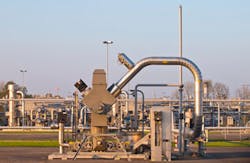Natural gas wells contribute significantly to methane emissions, study finds
A new study carried out by researchers at Purdue and Cornell universities suggests that methane emissions from natural gas wells are higher than expected, raising concerns that drilling and production of the fuel might be contributing to climate change.
The study, published in the Proceedings of the National Academy of Sciences, examined samples of air above the Marcellus shale in Pennsylvania. Researchers detected significant amounts of methane and traced them to seven natural gas wells, all of which were in their drilling stage — a pre-production phase that has not been associated with methane emissions so far, a statement by Purdue University explained.
The findings from the study could have serious implications for the Obama administration program on tackling climate change, as they suggest that regulations for methane-capturing technologies may not be effective for trapping all the methane escaping natural gas wells. Samples taken above these wells revealed methane at levels between 100 and 1,000 times higher than current inventory estimates, Purdue chemistry professor Paul Shepson said.
SPONSORED: Conveying, screening and separating equipment for the processing industries
Even though the wells that emitted elevated methane levels represented barely one percent of the total number of wells in the area, emissions from them accounted for around 4 percent to 30 percent of the total, the study found. Shepson commented that those findings were consistent with the idea that a small number of shale gas production components accounted for a large proportion of emissions.
